Gone, But Not Forgotten
This page is dedicated to the people who have played with Johnny Winter, but have left us for a better place. They will always be fondly remembered, and their music will live on forever!
Willie Dixon
As a dominent force in shaping postwar Chicago blues, Willie Dixon helped further the career of Muddy Waters, penning such songs as "Hoochie Coochie Man" and "I Just Want To Make Love To You". He wrote the Howlin' Wolf classics "Evil", "Spoonful", I Ain't Superstitious", "Little Red Rooster", and "Back Door Man". He also laid claim to Little Walter's "My Babe" and Sonny Boy Williamson's hit, "Bring It On Home". Many of his songs were reinterpreted by English and American blues rock bands. Cream recorded "Spoonful", Led Zeppelin "I Can't Quit You Baby" and "You Shook Me", while the Doors recorded "Back Door Man".
Willie Dixon was born on July 1, 1915 in Vicksburg, Mississippi. His mother wrote and recited religious poetry, which helped him learn rhyming and meter at an early age. He sang with the Union Jubilee Singers, a gospel quartet that had it's own radio program on WQBC in Vicksburg. But before pursuing music full-time, Willie sought to be a
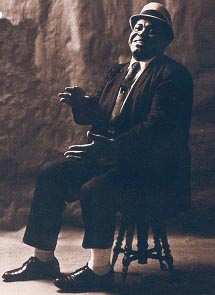
professional boxer. In 1936, he left Vicksburg for Chicago, and within a year he won the Illinois State Golden Gloves championship. His boxing career would prove be short lived. One day, while in com- missioner's office, he had heavy-duty quarrel(over money) with his manager. That would lead to the end of whatever dreams he had inside the boxing ring.
Not long after hanging up the gloves, Willie began his career as a full-time musician. In 1939, he started playing the bass, and formed the Five Breezes with Leonard "Baby Doo" Caston. With their newly formed band, they played numerous clubs in Chicago, and did some recording. In 1941, Willie declared himself a "conscientious objector", and was arrested for refusing to serve in the military. While Willie was in prison, Caston formed the Rhythm Rascals, a trio that played USO clubs in the Pacific, Africa, and Europe.
Upon completing his sentence, Willie formed a new group called the Four Jumps Of Jive. Within a year, Caston returned to Chicago, located Willie, and resumed their partnership as they formed the Big Three Trio with Bernardo Dennis(later replaced by Ollie Crawford). Supporting a line-up of soft blues, boogie woogie, pop, and novelty, Big Three's potential success was spotted by Bullet Records, who signed them to a recording contract. Big Three Trio performed together until 1952, when "Baby Doo" left the group due to personal and financial problems.
Most noted for his composing talent, Willie's career blossomed in 1954, when Muddy Waters recorded "Hoochie Coochie Man", and Howlin' Wolf recorded "Evil". He continued his songwriting, which brought forth such standards as "The Seventh Son", "Wang Dang Doodle", and "You Can't Judge A Book By It's Cover". Working as a session musician, he also recorded with many artists, including Muddy Waters, Chuck Berry, Bo diddley, Little Walter, and Jimmy Witherspoon. In whatever spare time he had, Willie also arranged and produced sessions for Chess Records.
In 1957, he worked with Cobra Records, which gave the opportunity to work with Magic Sam, Otis Rush, and Buddy Guy. In the late 50's and 60's, he performed in the American Folk Blues Festival in Europe and formed the Chicago Blues All-Stars.In the 70's and 80's, Willie toured regularly and recorded for several labels. He also scored music for the movie, The Color Of Money, and produced Bo Diddley's version of "Who Do You Love" in La Bamba.
In 1980, Willie Dixon was inducted into the Blues Foundation's Hall Of Fame. And he continued to play clubs and festivals. With royalty money from his song catalog, he formed the Blues Heaven Foundation in 1982. This non-profit organization offers programs as blues-in-the-schools and scholarship funds, and also gives aid to down & out blues artists. In 1988 he released the album "hidden Charms", which received much praise. He also completed an autobiography, "I Am The Blues"(co-written by Don Snowden). By 1990, Willie's pace was slowed considerably, due to ill health. Despite this set-back, he worked on a part-time basis for the next two years, until he died of a heart ailment in his Burbank, CA home on January 29, 1992.
Dan Hartman
Dan Hartman was born on November 4, 1950 in Harrisburg, Penn-
sylvania. He started classical piano studies at the age of seven. When he was thirteen, he formed his own group, The Legends, which also included his brother, Dave. Dan penned a number of songs for the group, and played electric piano, organ, and guitar. Although they started out as a soul group, they soon moved into rock music. The Legends released a number of 45's, including "Why/Baby Get Your Head Screwed On", in 1968.
Upon listening to Dan's demo tape, Blue Sky president Steve Paul introduced him to Edgar Winter, who had just disbanded Edgar Winter's White Trash, and Dan was invited to join the Edgar Winter Group. The double platinum album "They Only Come Out At Night", released in 1972, was the end product of Dan and Edgar's first collaboration. Dan was featured on bass, guitar, keyboards, and vocals. He sang lead on several songs, including the hit single "Free Ride". He either wrote or
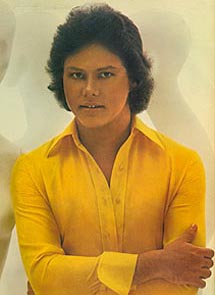
co-wrote six of the album's ten songs. Dan was also featured on the group's 1974 Gold album "Shock Treatment". That year, he made a guest appearance on Johnny Winter's "Saints & Sinners", playing bass, singing background vocals, and co-writing "Rollin' Cross The Country" with Edgar Winter. In 1975, Dan played on his third and last album for the Edgar Winter Group, titled "The Edgar Winter Group With Rick Derringer". He also guest spotted on Rick Derringer's "Spring Fever" and Todd Rundgren's "Initiation" albums, and co-produced Edgar Winter's solo LP "Jasmine Nightdreams". In 1976 he performed on the Johnny & Edgar Winter live release "Together", and produced Foghat's Gold album "Night Shift".
In 1976, Dan released his first solo outing titled "Images", with his father doing the whistling track on the beautiful soft-rock ballad "Thank You For The Good Times". In 1977, Dan produced and also performed on Thirty-Eight Special's "Thirty-Eight Special" LP, and made a guest appearance on the Edgar Winter's White Trash "Recycled" album.
In 1978, sensing that the rock scene had grown increasingly jaded, Dan decided to experiment with the pop/dance sound. He released the album "Instant Replay"(the title cut became a Gold single) and did some vocal work on Rick Derringer's "If I Weren't So Romantic, I'd Shoot You" album. After a world-wide tour, Dan scored again with the 1979 release "Relight My Fire", which included a sizzling duet with Loleatta Holloway on the album's title cut. The LP also featured Dan jamming with Edgar Winter and Stevie Wonder on the song "Hands Down". Dan intended to write and produce music alone, constructing pieces by laying down music tracks one on top of another. "Instant Replay" and "Relight My Fire" were written and recorded while he was living at the "Schoolhouse" in Westport, Connecticut.
In 1981, he released "It Hurts To Be In Love", an album that had moved away from the disco scene with melodic and amost Country Music tones. Dan had returned to the music style that was first heard on the "Images" album, but the music had matured. Although the LP contained several catchy tracks, the album was not a success, and took Dan's solo career further away from the limelight. But, success returned in 1984 with Dan's collaboration with Charlie Midnight and the release of the album "I Can Dream About You". The single of the same name appeared in the film "Streets Of Fire". Of all the singles released by Dan Hartman, "I Can Dream About You" is probably the most well known.
Dan moved from the "Schoolhouse", which he rented, and bought a multi-level house on the banks of the river in Westport. He used the studio in the rear of the house to write and produce his 1989 album "New Green Clear Blue", his penultimate solo LP. The tracks, played and recorded live, were a journey into the subconscious. And although the album received very good reviews, it was not a commercial success.
After being diagnosed HIV positive, Dan's last major production projects included tracks for Holly Johnson and Tina Turner. He died on March 22, 1994 in Westort, Connecticut. His last singles "The Love In Your Eyes" and "Keep The Fire Burnin'", were released after his death. His final album, also titled "Keep The Fire Burnin'", a compilation of previously released songs, was also released after his death.
Dan Hartman was a man of tremendous musical talent. He played several instruments: guitar, bass, keyboard, and drums. He was an exceptional vocalist, excellent record producer, and one the most passionate songwriters of our time.
Randy Hobbs
Randy Jo Hobbs was born in Randolph County, Indiana on March 22, 1948. Randy learned music from his father, a professional musician who played drums, fiddle, 5-string banjo, and tenor guitar. From the time he was five, Randy used to sit in with his father's bands.
When he was fourteen, he taught himself to play bass, and the following year he started a band called the Coachmen. One year later, at the age of sixteen, he met Rick and Randy Zehringer, and joined their group Rick and the Raiders, which was soon to be called the McCoys. The McCoys played bars and small dance halls all around Union City and near by Greenville, Ohio, making their way to bigger and bigger venues. In Dayton, Ohio, an up and coming band known as the Strange Loves("I Want Candy") took notice of the McCoys and spread the news to their manager, Bert Berns. It was Bert's idea to try the McCoy's out on the song "Hang On Sloopy", which had been a minor hit a few years earlier. "Hang On Sloopy" sold more than six million copies world wide
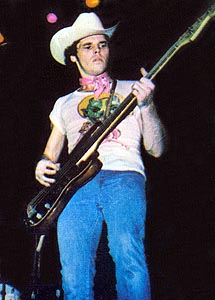
and catapulted Randy(Rick & Randy Zehringer, and Ronnie Brandon) into the world of rock stardom. Riding the wave of their smash hit single, the McCoys toured with many top bands of the day, including the Rolling Stones in 65-66.
The McCoys had several more hit singles on their first label, Bang Records, but nothing would rival the success of "Hang On Sloopy". In 1967, Ronnie Brandon left the band and was replaced by Bobby Peterson. In the late 60's, they switched to Mecury Records, where they recorded two psychedelic rock albums, which were critically acclaimed despite low sales. The McCoys played almost nightly at Steve Paul's Scene Club in NYC, where Randy jammed frequently with such stars as Jimi Hendrix, Buddy Miles, and Todd Rundgren.
In 1970, Steve Paul became manager of the McCoys. Soon after, the McCoys(minus Bobby Peterson) would join forces with Johnny Winter to form the group Johnny Winter And. Randy played bass on the two Johnny Winter And albums: "Johnny Winter And" and "Johnny Winter And Live". When Johnny Winter And broke up in 1971, Randy became bassist for Edgar Winter's White Trash, and can be heard on their live masterpiece, "Roadwork". Randy played in the Edgar Winter Group when it was first being formed, but a middle ear infection kept him away from performing until 1973, when he joined again with Johnny Winter. Randy played and toured with Johnny from 73-76. During that stretch, his powerful bass lines can be heard on the albums: "Still Alive And Well", "Saints And Sinners", John Dawson Winter 111", Captured Live", and "Together". Randy left Johnny's band after the '76 tour and went on to play bass on the Montrose lp "Jump On It".
After performing on the "Jump On It" album, Randy returned to Union City, where it all began some 12 years earlier. Despite all of his success with the McCoys, Edgar Winter's White Trash, and Johnny Winter, Randy was broke. He had nothing except an enormous drug habit that would have killed three people. He continued on a downward spiral until his body just couldn't take it any more. He was found dead on August 5, 1993 in Dayton, Ohio.
During his concert at Lupo's Heartbreak Hotel in Providence, RI, on that sad night of August 5, 1993, Johnny Winter dedicated an emoitional version of "The Sky Is Crying" to Randy Hobbs.
Richard Hughes
Richard Hughes was born in Trenton, New Jersey on March 31, 1950. When he was fifteen, he began playing an old drum his brother had left lying around the house. And a year later, he played with his first rock band, for which he got paid $2.50.
In high school, he constantly played with several dance bands, and with a group called Calliope, who released several local singles. He also recorded with a group called
the Millburnaires, who also recorded locally.

After a year at Villanova University, where he studied business, and four months in the National Guard(he had
enlisted-and was given a medical discharge), he decided to seriously dedicate his life to music. He started a group called Cobalt, while working as a stockboy at Bloomingdale's to support himself.
A friend of Richard's knew Rick Derringer, who was producing for Johnny Winter at the time. And after Rick saw Cobalt, he was impressed by Richard's drumming. A few days later, Johnny drove down to New Jersey to hear Cobalt rehearse. After hearing three songs, Richard and Doug Brockie, the band's lead guitarist, were asked to join forces with Johnny. While Doug's stay with Johnny was very brief, Richard toured with Johnny from 1973 through 1976. He also came back for a tour with Johnny in 1981. Richard's blistering performances on the albums Still Alive & Well, Saints & Sinners, John Dawson Winter 111, Captured Live, and Together, leave little doubt that he was definitely a "big time" rock & roll drummer.
Unfortunately, the pressures of touring and being in the spotlight, plus mounting personal problems caused Richard to crash. He took his own life at the age of 35.
Isaac Payton Sweat
Isaac Payton Sweat was born in Port Arthur, Texas in 1945 and moved to nearby Nederland at a young age. Ikey's(as Isaac was called) father was a professional musician and traveled the road playing dance halls, but none much farther than 100 miles away. Ikey played the banjo at the age of thirteen, and then played the guitar in several high school rock bands. During that time, Country Music was not popular with high school kids, and most bands played rock music. Although he learned to read music, he always played by ear.
Ikey played in a group called the Continentals, where he made $8.00 a night, but they only lasted a year. He than enrolled in Lamar University's pre-med school and minored in music. But playing at night and attending school during the day was too much, and he dropped out after only a couple of months. Johnny Winter and Ikey had attended different high schools, but had known each other through their band activities. Ikey joined Johnny's
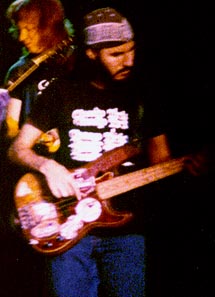
band, the Crystaliers, later named the Coastliners. They had a number 1 regional hit titled "Eternally".
the band toured for three years, traveling in an ever widening radius, which eventually went as far as Georgia. Ikey played bass on Johnny's "White, Hot, & Blue" album. then he went "psychedelic" in the days of blacklights, posters, and long hair. When he switched to Country Music, he considered himself the original Country "outlaw", when he had a beard and Willie Nelson was still in Nashville with a military haircut. Ikey cut his hair and began playing conservative Country Music. He cut a vocal version of the Al Dean instrumental standard "Cotton Eyed Joe", which became a big regional hit. In 1980 everyone was doing "The Cotton Eyed Joe". Isaac Sweat WAS "MR. COTTON EYED JOE".
Ikey did not like, or understand the business side of the record industry and felt that he didn't get what he deserved from his best selling single. However, it was said that he had recorded "Cotton Eyed Joe" for a flat fee, therefore no royalties were due. Without a valid contract, he was free to re-record the song for Paid Records in 1981. When he got his first royalty check from Paid Records, he said that out of all the recordings he had made, that was the first time he had ever received any royalties.
Ikey became disgusted with local radio, for as hard as he tried, he could not get them to play any of his records since "CottonEyed Joe". Most stations at the time had quit playing local records and were playing national hits. Ikey achieved opposite of the desired results with local radio personnel. He went from manager to manager. He seemed to leave the good one too quickly, and stay with the bad ones way too long. But he was working steady and had gone to Nashville, where he recorded "A Redneck Is The Backbone Of America", for which he had high hopes, and three other songs for Telstar Records, the last one being "The Day The Music Died".
He was found dead of a contact gunshot wound at 1:30 AM on June 23, 1990. Ikey's wife discovered his body in the garage of his Richmond, Texas home. A 25 caliber automatic pistol, keys, and sunglasses were on the floor near his left hand(Ikey was right-handed). He had just returned from a performance in a Houston area club. The Justice of the Peace said the findings did not back up the theory of suicide. No traces of gunpowder were found on either hand. The circumstances surrounding his death are still not resolved.
Isaac Payton Sweat had enough success to feel fame was within his grasp, which would make any performer frustrated. He did achieve fame with an old folk song done many times before and kept alive by Al Dean, until Ikey could write lyrics and create a new hit. Years later it is still selling, and people are still dancing to Ikey's "Cotton Eyed Joe".
Muddy Waters
As a vocalist, Muddy Waters had few parellels. As a blues bandleader, he had none. More than any other performer, he was responsible for forging Mississippi Delta blues into hard-edged, electrified, Chicago postwar blues. And some of his own bands were the stuff legends are made of. In the 1950's alone, he employed guitarists Jimmy Rogers and Pat Hare, bassist Willie Dixon, pianists Otis Spann and Memphis Slim, and the top names in blues harmonica:Little Walter, Walter Horton, Sonny Boy Williamson, Junior Wells, and James Cotton. In the 1960's, the Rolling Stones named themselves after one of Muddy's songs. He influenced dozens of British and American blues rockers: Chuck Berry, Bob Dylan, Jimi Hendrix, Jeff Beck, and Johnny Winter to name a few. Muddy was commonly titled "Father Of Electric Blues". Through the years and various sidemen, his music remained intensely his own. His vocals and playing patterns have often been copied, but no one has ever quite captured his touch.
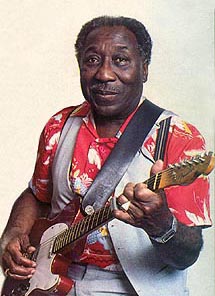
McKinley Morganfield was born on April 4, 1915 in Rolling Fork, Mississippi. As a toddler, he loved to crawl in Deer Creek behind his father's two-room shack, so his grandmother nicknamed him Muddy. His sisters added Waters. His father, Ollie, played blues guitar, but Muddy wasn't around long enough to remember it. At the age of three, with the death of his mother, Muddy was bundled off one hundred miles north to be raised by his maternal grandmother, Della Jones, who lived three miles northwest of Clarksdale on Stovall's Plantation.
At the age of seven, Muddy received his Christmas wish, a "French harp". He played harmonica until he was 17, when he made the switch to guitar. Within a year, he had mastered the bottleneck style and the jagged, pulsating rhythms of Delta guitar. Son House frequented Clarksdale and provided young Muddy with considerable inspiration. While elements of Muddy's guitar tone and vocal style were drawn from House, his arrangement techniques and slide embellishments were closer to that of Robert Johnson. Muddy considered his style to be a mixture of all three. He said "I had part of my own, part of Son House, and a little part of Robert Johnson. I seen Robert Johnson at a distance a couple of times, but never actually seen him play. I liked his style. I though he was real great from his records, beautiful. Really, though, it was Son House who influenced me to play".
During the summer of 1941, Alan Lomax and John Work, two members of the Library of Congress' field recording team, journeyed to the Delta to find Robert Johnson. By then, Johnson was dead, and their second choice, Elomore James, couldn't be found. Locals directed them to a tough, young field hand, who played in a manner remarkably similar to Robert Johnson. He worked under the name of McKinley Morganfield, but everyone called him Muddy Waters. He recorded several songs for Lomax. Two of them, "Country Blues" and "I B's Troubled" were released on a Library of Congress folk anthology album. The following summer, Muddy recorded again for Lomax. These early Library of Congress recordings would br issued in the 60's on Testament Records' "Down On Stovall's Plantation.
Many of the men Muddy knew had been lured to big cities up North by the abundance of good paying wartime jobs. In May of 1943, carrying only a suitcase and guitar, he pulled out of the Clarksville train station and arrived in Chicago the next morning. Big Bill Bronzy helped Muddy break into the city's thriving blues scene. For a while, Muddy played acoustic guitar behind Sonny Boy Williamson. But his reputation as a performer didn't take shape until 1944, when he began to play electric guitar, teaming up with Jimmy Rogers on harp, Claude Smith on guitar, and then with Eddie Boyd on piano(later joined by Sunnyland Slim). Muddy was still playing in the traditional Delta bottleneck style, but his sound was fatter, louder, and far more moving than before.
Muddy's first Chicago recordings occurred in 1946, when Columbia Records' producer Lester Melrose hired him to record three sides(without bottleneck). But these tracks would not be released until 1971. In 1947, he played guitar behind Sunnyland Slim on two Aristocrat sides, "Johnson Machine Gun" and "Fly Right Little Girl". Two other songs, "Gypsy Woman" and "Little Anna Mae" were recorded by Muddy, with Ernest "Big" Crawford on string bass. Len Chess, co-owner of Aristocrat, was unimpressed with the two songs, but agreed to let Muddy record the following year. Accompanied again by Big Crawford, Muddy cut "I Can't Be Satisfied" and "I Feel Like Going Home". Both songs were old-fashioned Delta blues, but Muddy's shivering electric bottleneck guitar gave them an exciting new edge. "I Can't Be Satisfied" was released on a Saturday morning in April 1948, and it's initial pressing was sold out by 2:00 that afternoon. Muddy & Big Crawford's final 1948 recordings were "Train Fare Home" and "Sittin' Here And Drinkin'(Whiskey Blues)".
In 1950, Muddy had his first nationwide hit: "Lousiana Blues", which climbed into the R&B top ten. And what followed in the years 1951-1960 were some of the greatest electric blues recordings ever made. Muddy's originals like "Long Distance Call", "She Moves Me", "Mannish Boy", and "She's Nineteen years Old" were supplemented by songs that Willie Dixon had written: "Hoochie Coochie Man", "I Just Want To Make Love To You", and "I'm Ready", among others. These records defined the Chicago blues sound during it's classic period. Though Muddy had all but given up playing guitar by the mid 50's, his voice, thick and rough, gave the recordings and his live performances their incredible power.
Chess Records released Muddy's debut album in 1958, a collection of his hit singles titled "The Best Of Muddy Waters". Later that year, Muddy toured England with his pianist Otis Spann. The English tour gained the attention of American folk and jazz fans. To capitalize on the newfound audience, Chess released "Muddy Waters Sings Big Bill" in 1959, an undistinguished acoustic album of Big Bill Broonzy material.
In 1960, Muddy's electric band was a sensation at the Newport Jazz Festival. Chess quickly issued "Muddy Waters At Newport", but still continued to push Muddy as a folk blues artist to capitalize on the continuing interest of white fans in "down home" blues. The album "Muddy Waters Folk Singer" was released in 1964. The soulful "Brass And The Blues" was released in 1966, followed by "The Real Folk Blues" and "More Real Folk Blues", both of which were collections of Muddy's early chess sides. A number of his late 60's and early 70's albums, especially "Fathers And Sons", "They Call Me Muddy Waters"(which won a Grammy for best ethnic/traditional recording in 1971), and "The London Muddy Waters Sessions"(which featured muddy jamming with English blues rockers like Rory Gallagher) sold almost exclusively to white record buyers. In the 1970's, Muddy toured all over the world, including a U.S. tour with Johnny Winter and James Cotton in 1977.
1977 also marked the beginning of Muddy's recordings with Johnny Winter on CBS' Blue Sky label. Muddy had been Johnny's idol since he was 11 or 12 years old. Johnny really understood Muddy's music and produced the grammy winning "Hard Again" album, which included "Mannish Boy" and "I Can't Be Satisfied". Muddy and Johnny won another grammy with the release of "I'm Ready" in 1978, covering "I'm Your Hoochie Coochie Man" and "Good Morning Little School Girl". Then they sorted through material from their 1977 shows in Detroit and 1978 performances in Chicago for the stunning, grammy winning, 1979 album "Muddy Mississippi Waters Live". This album left no doubt that Muddy was still at the height of his powers. Johnny produced Muddy's final record, "King Bee" in 1981. Muddy continued performing, and arranged to cut an album in the summer of 1983. But his plans were stilled on the night of April 30, when he peacefully passed away at home in his sleep.
The death of the 68 year-old bluesman added only postscript to one of the world's greatest musical legacies. His spirit and influence will live on forever, as long as electric blues music is being played.